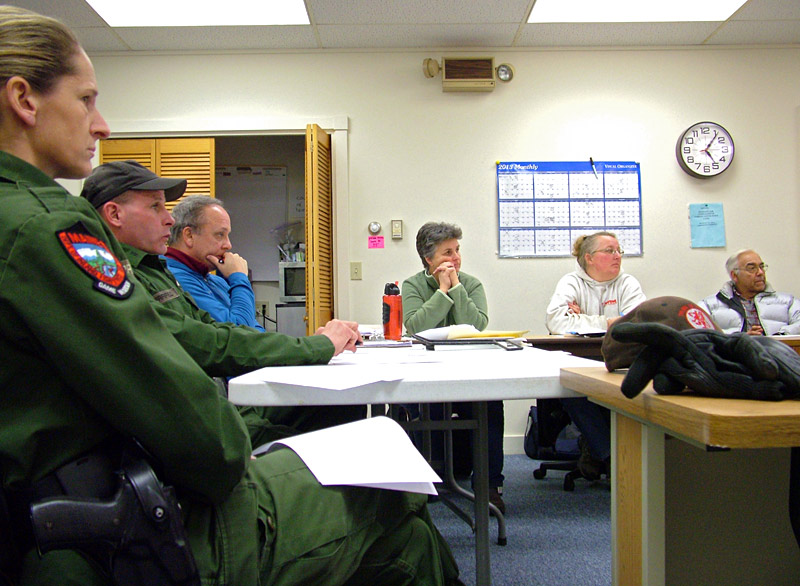Taking the recreation out of hunting (but keeping the rack)
ISLESBORO - Islesboro hunters killed 49 deer during a three-week, special deer reduction hunt in December according to figures tallied by the town and presented to officials from the Maine Department of Inland Fisheries and Wildlife, Jan. 3.
Both town and state officials saw the results as promising and somewhat ambiguous.
The hunt came as the result of five years worth of studies aimed at reducing Lyme Disease on the island, which spiked in 2011 with 29 confirmed cases. In prior years, the number of cases had mostly been in the single digits.
Lyme disease is transmitted to humans and pets by deer ticks. Other other animals can carry the ticks, but studies of Islesboro's emerging Lyme epidemic pointed to the island's booming deer population.
Studies in 2010 and 2011 estimated 62 and 48 deer per square mile, respectively, inhabiting the 17-square-miles of Islesboro and nearby 700 Acre Island, putting the total number greater the resident human population.
The goal of the hunt, and additional hunts over the next two years as allowed by the state, has been to reduce the per-mile density to 10.
Despite a town committee's exhaustive research into deer reduction stategies used in other island communities, however, Keel Kemper, a regional biologist for IFW, said Thursday that Islesboro presents a unique problem.
"It's a huge piece of property," he said, looking out the window of the Margaret Chase Smith ferry at a stretch of land that could easily be mistaken for a peninsula. "It's like half a township, which means it's really big. It's not like [the deer] are all hemmed up and you can push them into the water."
Comments at the meeting later suggested that hunting on Islesboro is also more complicated than on the mainland.
The forest there is dense with relatively few deciduous trees. Properties on the island tend to be long and narrow making it difficult for hunters to follow the deer without trespassing. Even shooting a gun, which was allowed on the island for the first time last month as a condition of the special hunt, becomes a problem of geometry on a 200-foot wide property.
"I was pretty pleased no one got shot," Kemper said.
According to representatives of the Islesboro Deer Reduction Committee, of the approximately 50 residents who qualified for the special hunt, 15 tagged deer. Kemper said it was common in hunting or fishing that the majority of the take is brought in by a minority of licensed participants.
But given the stringent requirements for Islesboro's special hunt, which included taking a safety course and getting state certification, some on the deer reduction committee wondered what had happened to the other 35 hunters.
Chairman Fred Thomas asked Kemper if the state might be more flexible on rules for next year's hunt, especially with regard to baiting, which he said the town was intially led to believe would be permitted but was ultimately not allowed.
"It kind of gives people the perception that this is a recreational hunt. And it's not," he said. "It's a deer reduction, but it's being performed like it was a recreational hunt."
700 Acre Island's committee member Carol Macaulay suggested allowing rifles. "We'd have a better chance here on Acre Island and it would be just as safe, if not safer," she said.
The prohibition on rifles came as the result of a survey of island residents.
Kemper cautioned that allowing rifles would invite criticism that it was merely another recreational hunt. Thomas agreed, but said the misperception was already there and was caused by restrictions coming from IFW. Kemper was sympathetic.
"Based on what's going on here, trust me, this biologist is about reducing square footage of deer hide on this island," said Kemper. "I'll hold the flashlight for you if they'd let me ... but I have to go back and explore and see how much tweaking the commissioner is going to tolerate."
Laura Houle a member of the Deer Reduction Committee who ran one of two tagging stations during the special hunt, guessed that the numbers of deer shot in special hunts could drop off in subsequent years.
"If it's going to be less than 50 deer, were going to have to look at other things," she said. "Is it the time of year? Is it the weapons? All of those things are going to come into play."
Kemper agreed but asked how town officials proposed to get there.
"More tools in the toolbox," said Thomas.
Game Wardens Mark and Michelle Merrifield also attended from IFW. Asked what they thought, Mark Merrifield qualified his remarks noting that his job is to enforce the rules, but said the prohibition on baiting didn't match the goal of the hunt.
"If this is a deer reduction thing, why aren't we bringing the deer to the baiting places where people can shoot them?" he said.
Merrifield said he believed it would be more effective and safer. "More people aren't going to be sprayin' and prayin' if they're bringing them to an area," he said. "They're going to be using slugs and they're going to be doing it in a safer manner because they know what the surroundings are."
After three weeks of shotgun hunting, the issue of safety remained a hypothetical one. Islesboro Police Chief Fred Porter said he had no hunting-related complaints.
Asked by committee members how the town might get the baiting prohibition lifted, Kemper recommended working with a local legislator or meeting directly with officials in Augusta.
Michael Boucher, a hunter who attended the meeting, suggested a doe-only season, which he said would break the reproductive cycle more effectively than targeting all deer. It might also win over some archers who opposed the special hunt, he said.
"Then you're really targeting the deer that are causing the population to explode, plus you're providing for an enhanced recreational opportunity the next year where there will be more an bigger bucks available," he said.
Thomas thought the restrictions would discourage participation in the special hunt and tie the hands of the small number of hunters who were able to shoot any kind of deer this season. According to town statistics 14 of the 49 deer tagged in the special hunt were adult males.
Committee members discussed other issues with the IFW representatives including fees associated with permits for the hunt and licensing procedures, many of which Thomas said pointed to a recreational hunt.
"We want to reduce the deer because people are getting Lyme Disease," he said. "That's the driving force ... It's a job, I was consumed just to get the couple I got. I was letting things slide I should have been taking care of."
Kemper said that's why he would be opposed to limiting the hunt to does.
"People are not going to pass on a buck so that bow hunter next year can get a nice one," he said, drawing a round of laughter from the committee.
Thomas joked about spotting a deer after sitting in the freezing woods for half a day but having to let it go because it has horns.
"There again, we're a recreational hunt," he said. "No it's not, we're reducing the deer herd."
The Deer Reduction Committee will hold a meeting Saturday, Jan. 12 at 1 p.m. at the Sporting Club to hear comments and suggestions from all who qualified for the special hunt, regardless of participation.
The next committee meeting will be held Jan. 24 at 4:30 p.m. at the Town Office.
Contact Ethan Andrews by e-mail at news@penbaypilot.com




























